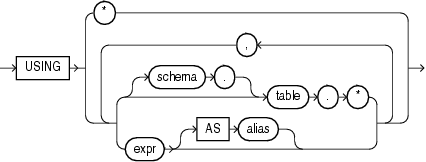FEATURE_SET

Description of the illustration feature_set.gif

Description of the illustration feature_set_analytic.gif

Description of the illustration mining_attribute_clause.gif
Description of the illustration mining_analytic_clause.gif
See Also:
"Analytic Functions" for information on the syntax, semantics, and restrictions ofmining_analytic_clauseFEATURE_SET returns a set of feature ID and feature value pairs for each row in the selection. The return value is a varray of objects with field names FEATURE_ID and VALUE. The data type of both fields is NUMBER.
You can specify topN and cutoff to limit the number of features returned by the function. By default, both topN and cutoff are null and all features are returned.
-
topNis theNhighest value features. If multiple features have theNth value, then the function chooses one of them. -
cutoffis a value threshold. Only features that are greater than or equal tocutoffare returned. To filter bycutoffonly, specifyNULLfortopN.
To return up to N features that are greater than or equal to cutoff, specify both topN and cutoff.
FEATURE_SET can score the data in one of two ways: It can apply a mining model object to the data, or it can dynamically mine the data by executing an analytic clause that builds and applies one or more transient mining models. Choose Syntax or Analytic Syntax:
-
Syntax — Use the first syntax to score the data with a pre-defined model. Supply the name of a feature extraction model.
-
Analytic Syntax — Use the analytic syntax to score the data without a pre-defined model. Include
INTOn, wherenis the number of features to extract, andmining_analytic_clause, which specifies if the data should be partitioned for multiple model builds. Themining_analytic_clausesupports aquery_partition_clauseand anorder_by_clause. (See "analytic_clause::=".)
mining_attribute_clause identifies the column attributes to use as predictors for scoring. When the function is invoked with the analytic syntax, these predictors are also used for building the transient models. The mining_attribute_clause behaves as described for the PREDICTION function. (See "mining_attribute_clause::=".)
See Also:
-
Oracle Data Mining User's Guide for information about scoring.
-
Oracle Data Mining Concepts for information about feature extraction.
About the Example:
The following example is excerpted from the Data Mining sample programs. For more information about the sample programs, see Appendix A in Oracle Data Mining User's Guide.This example lists the top features corresponding to a given customer record and determines the top attributes for each feature (based on coefficient > 0.25).
WITH
feat_tab AS (
SELECT F.feature_id fid,
A.attribute_name attr,
TO_CHAR(A.attribute_value) val,
A.coefficient coeff
FROM TABLE(DBMS_DATA_MINING.GET_MODEL_DETAILS_NMF('nmf_sh_sample')) F,
TABLE(F.attribute_set) A
WHERE A.coefficient > 0.25
),
feat AS (
SELECT fid,
CAST(COLLECT(Featattr(attr, val, coeff))
AS Featattrs) f_attrs
FROM feat_tab
GROUP BY fid
),
cust_10_features AS (
SELECT T.cust_id, S.feature_id, S.value
FROM (SELECT cust_id, FEATURE_SET(nmf_sh_sample, 10 USING *) pset
FROM nmf_sh_sample_apply_prepared
WHERE cust_id = 100002) T,
TABLE(T.pset) S
)
SELECT A.value, A.feature_id fid,
B.attr, B.val, B.coeff
FROM cust_10_features A,
(SELECT T.fid, F.*
FROM feat T,
TABLE(T.f_attrs) F) B
WHERE A.feature_id = B.fid
ORDER BY A.value DESC, A.feature_id ASC, coeff DESC, attr ASC, val ASC;
VALUE FID ATTR VAL COEFF
-------- ---- ------------------------- ------------------------ -------
6.8409 7 YRS_RESIDENCE 1.3879
6.8409 7 BOOKKEEPING_APPLICATION .4388
6.8409 7 CUST_GENDER M .2956
6.8409 7 COUNTRY_NAME United States of America .2848
6.4975 3 YRS_RESIDENCE 1.2668
6.4975 3 BOOKKEEPING_APPLICATION .3465
6.4975 3 COUNTRY_NAME United States of America .2927
6.4886 2 YRS_RESIDENCE 1.3285
6.4886 2 CUST_GENDER M .2819
6.4886 2 PRINTER_SUPPLIES .2704
6.3953 4 YRS_RESIDENCE 1.2931
5.9640 6 YRS_RESIDENCE 1.1585
5.9640 6 HOME_THEATER_PACKAGE .2576
5.2424 5 YRS_RESIDENCE 1.0067
2.4714 8 YRS_RESIDENCE .3297
2.3559 1 YRS_RESIDENCE .2768
2.3559 1 FLAT_PANEL_MONITOR .2593